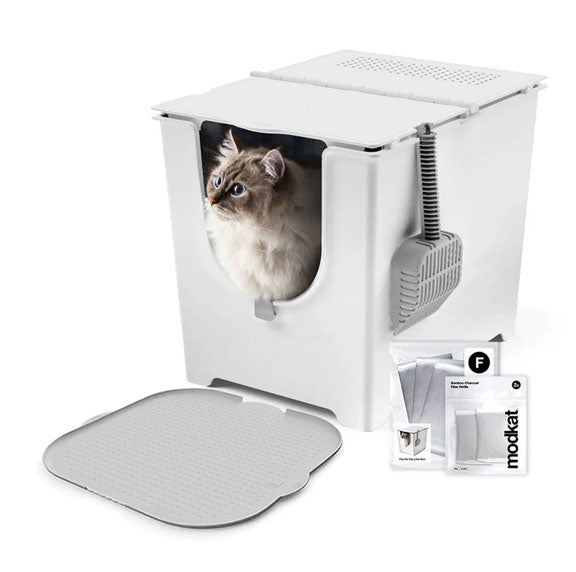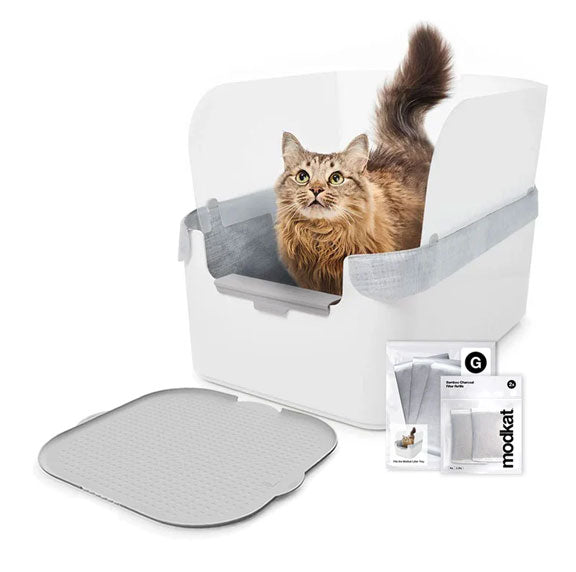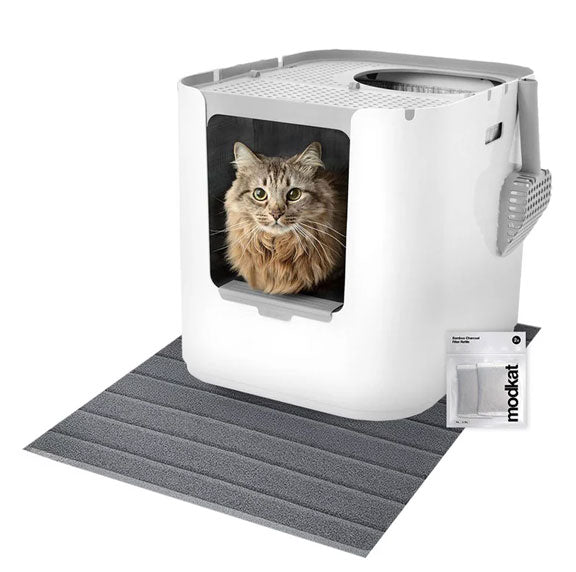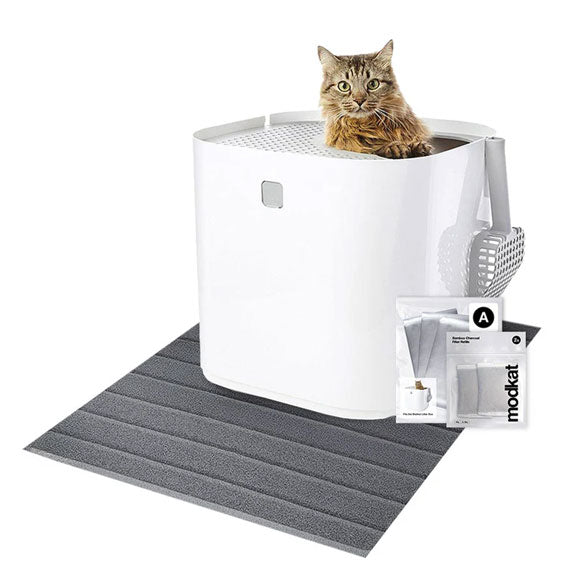20% off sitewide. Discount automatically applied.
20% off sitewide. Discount automatically applied.
Litter Boxes

Modkat Flip
Front-Entry Litter Box
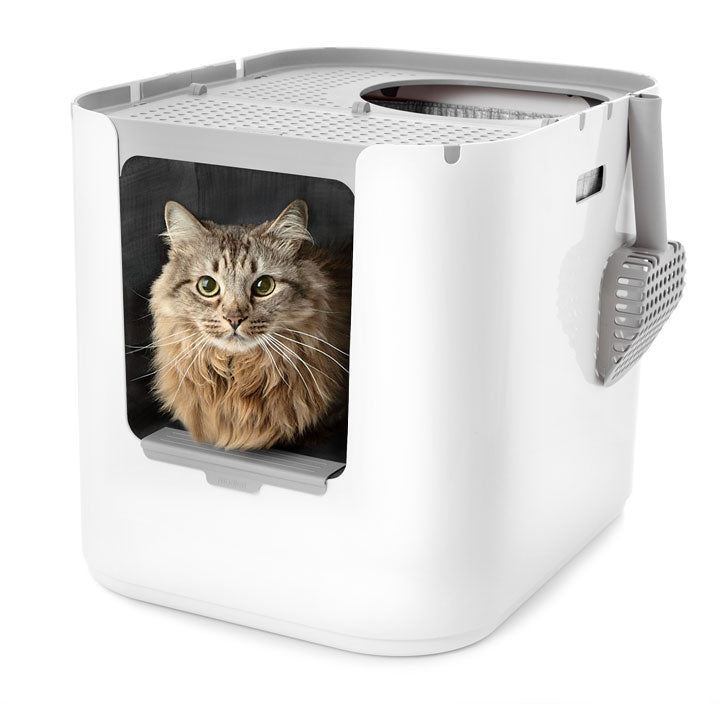
Modkat XL
Front/Top-Entry Litter Box
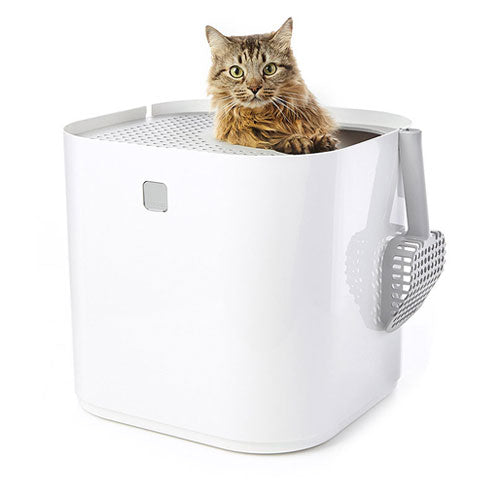
Modkat
Top-Entry Litter Box
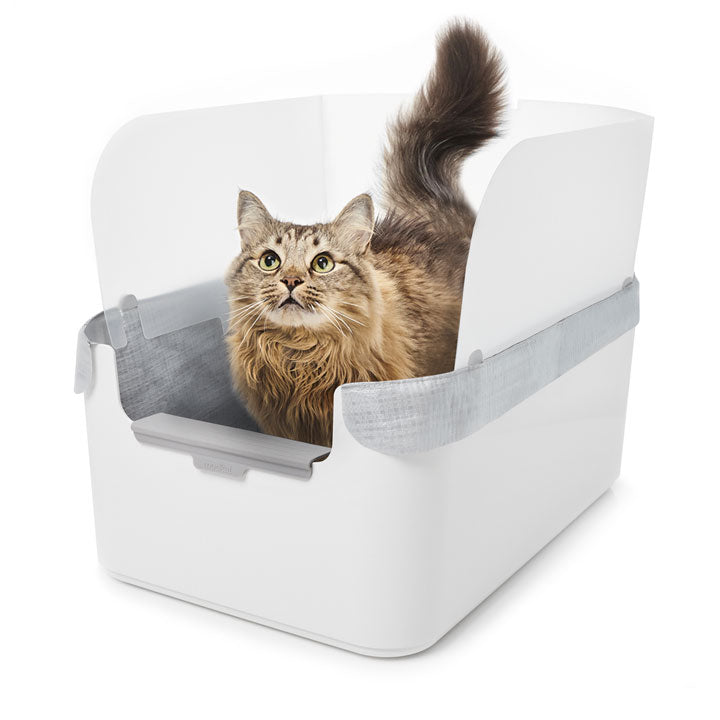
Modkat Tray
Open Litter Box
Bundles
Essentials

Litter Keeper
Two colors

Litter Mats
Multiple styles, colors & sizes

Tidy-Up Kit
Scoop holder & dustpan

Lounge + Play
Scratchers & toys
Refills
Add description, images, menus and links to your mega menu
A column with no settings can be used as a spacer
Link to your collections, sales and even external links
Add up to five columns
Add description, images, menus and links to your mega menu
A column with no settings can be used as a spacer
Link to your collections, sales and even external links
Add up to five columns
How do I know if my cat is deaf?
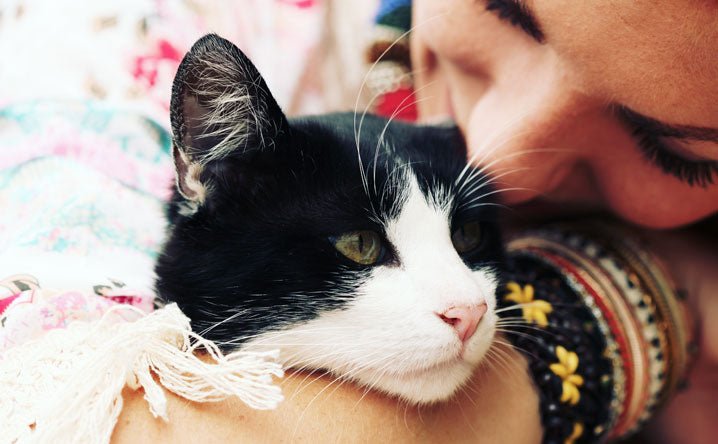
Cats lose their hearing for a variety of reasons. Some have congenital deafness, meaning they are born deaf, but most cases of feline hearing loss are acquired.
If you are considering adopting a deaf cat or if you believe your cat may be losing her hearing, you probably feel concerned. However, many deaf or hard-of-hearing cats still maintain rewarding lives. For their people, living with these cats is often a joy.
Causes of deafness in cats.
Congenital deafness in cats is most often linked to pigment in their coats and the irises of their eyes. About 17-22 percent of cats born with a white coat but not blue eyes are deaf. That number rises to 40 percent for white cats born with one blue eye. A white cat born with two blue eyes has a 65-85 percent chance of being deaf.
Interestingly, if a cat is born deaf in only one ear, it will be the ear on the same side as the blue eye. By the way, you probably won't notice if your cat is deaf in just one ear. Cats have such amazing hearing that their other ear will more than compensate for their partial deafness.
Most feline deafness is acquired, not congenital. Like humans, cats may lose their hearing as they age. Over time, eardrums grow less flexible, and the body systems simply don't work like they once did. Infections, degenerative diseases, chemotherapy, or tumors can also cause deafness.
Not all hearing loss is permanent. Ear mites, polyps, ear infections, and even wax buildup can lead to signs of hearing loss in cats. A visit to the vet will often solve most of these issues. If your pet has permanent hearing loss, however, they — and you — can learn to thrive.
Common signs of deafness in cats.
A typical cat has one of the broadest hearing ranges in the animal kingdom. Our feline friends can hear sounds ranging from 45 to 64,000hz. By comparison, our human range runs from 64 to 23000hz, and a dog's hearing range goes from 67 to 45000hz. When hearing well, cats hear really, really well. But hearing loss plagues many of these animals.
Here's how to tell if your cat is deaf or hearing impaired:
A deaf cat may not notice you enter the house. They might fail to respond to everyday sounds. They may not even react when you squeeze a loud squeaky toy. And like some humans with hearing loss, deaf cats may meow more loudly than they used to.
Key signs your cat is deaf include a decreased startle response, an increased amount of sleep, and clingy or needy disposition.
Decreased startle responses.
Lots of cats startle easily. Even a normally confident cat may jump if you suddenly stand up or just uncross your legs. This is called the "startle response." Deaf cats may lose this response.
Alternatively, a cat may realize that she's losing her hearing and begin to compensate. For instance, a cat coping with hearing loss might spend her days perched high above the room where she can rely on her keen sense of vision for protection.
Increased amount of sleep.
All cats sleep like it's an olympic sport. Healthy adult felines will snooze for about 15 hours a day. Senior cats and kittens can sleep for 20 hours. So just because your cat is dozing most of the day doesn't signify deafness. That said, non-impaired cats will wake up often during their rest whereas a deaf cat will usually sleep through anything.
Unusually clingy or needy.
Deaf cats, especially cats who lose their hearing later in life, may be disturbed by their reduced hearing function. These pets can turn to people for reassurance.
Only a veterinarian can tell you for sure if your cat has lost their hearing. If you have concerns, please make an appointment. Typically, your animal doctor will ask you questions about your pet's behavior and then conduct a physical exam. Most of the time, they can discover what they need to know by peering into your cat's ear with an otoscope. Sometimes, however, the vet may schedule your cat for a radiograph or MRI to assess the middle ear.
Living with a deaf cat.
What do you do if you learn your cat is deaf?
First, be sure to keep your cat safe. Never let a deaf cat out of the house. These animals cannot hear approaching bicycles, cars, people, or dogs and may make fatal decisions as a result.
Be cautious when approaching your hard-of-hearing cat. Remember, she may be skittish. A completely deaf cat, on the other hand, may respond well to a stomp on the floor because they can feel the vibrations.
Play, play, and play some more with your kitty. Like other cats, our deaf pets enjoy running, hunting, and playing chasing games.
Three FAQs about deaf cats.
Are deaf cats more affectionate?
Cats of all kinds can make sweet, loving pets, but… yes, deaf cats often show more affection than hearing ones. They usually adore being petted and snuggled because they rely on touch since they can't communicate with you through hearing.
How does a deaf kitten act?
Kittens show many of the same signs of deafness as adult cats. You may also notice them closely watching their littermates or other cats. That's because they're looking for cues about what to do.
How do you train a deaf cat?
Some people train deaf cats using hand signals much like you would train them using voice commands or a clicker. You could also try using a gentle vibrating collar that you can control.
Deaf or hard-of-hearing kitties make affectionate, delightful pets. Since cats do not experience the emotional toll of hearing loss that a human may endure, they will likely adjust to their new life with ease.
If you're concerned that your cat may be experiencing hearing loss, make an appointment with your feline-friendly vet today. And if you're considering adopting a deaf cat, we hope you enjoy many wonderful years together.
“It looks nicer than any other hooded or open option we considered.”

Categories
Meow from Brooklyn.
Sign up and get early access to product drops, exclusive offers, and the occasional cat meme.
Similar products related to this blog:
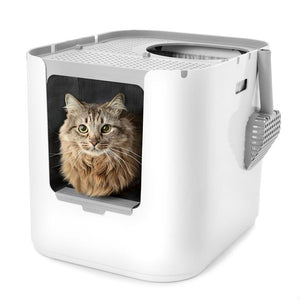
"It looks nicer than any other hooded or open option we considered."


"This litter box keeps everything in, nothing gets out the sides."
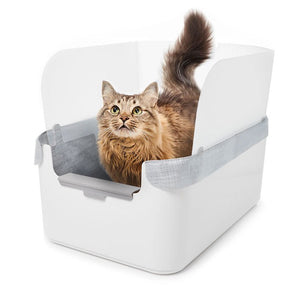
"My beautiful ragdoll cat and I both love the new Modkat Litter tray!"

